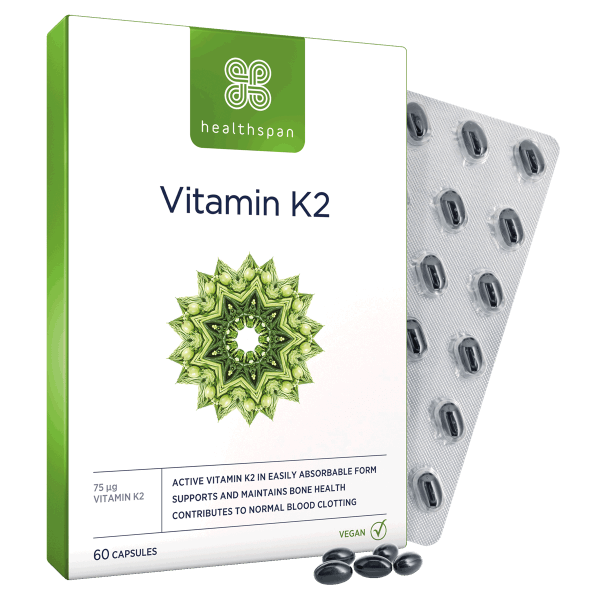Vitamin K has a vital role in blood clotting and is important for the heart, bones and teeth. Dr Hilary Jones explains.
🕒 3 min read
What is vitamin K?
Vitamin K is named after its discovery in 1929, when a German medical journal described it as the Koagulationsvitamin: a substance essential for blood clotting.
Since then we have learned more about its role in the human body; not just its ability to enable blood to clot, but in terms of heart, bone and dental health.
Foods high in vitamin K
There are two main types of vitamin K. K1 (phylloquinone) is mainly found in plant foods such as leafy greens, broccoli, and spinach, as well as vegetable oils and cereal grains.
K2 (menaquinone) is derived from animal foods such as high-fat dairy products and egg yolks, as well as liver and other organ meats. It's also found in fermented foods such as miso, natto and sauerkraut. Vitamin K is produced naturally by friendly bacteria in the large intestine.
Our normal diet provides about nine times more K1 than K2, but only around 10-15% is absorbed, meaning that the absorbed fraction accounts for about 50% of the intake.
In the body K1 can be converted to K2, but the inefficient absorption means that supplementation can be useful. This is especially the case after taking antibiotics, which can produce dysbiosis in the large intestine (an imbalance between beneficial and less beneficial bacteria) and poorer absorption as a result.
How much vitamin K do you need?
In theory, it should be possible to derive sufficient vitamin K from a varied and balanced diet, but our modern diet is generally low in the nutrient.
The recommended adult intake is one microgram per day for each kilo of bodyweight. A microgram is 1000 times smaller than a milligram, so a 70 kg adult would require 70 µg of vitamin K.

Vitamin K2 75 µg
For bone and blood health
- Active MK-7 form: reaches bones and blood vessel walls more easily
- Supports normal blood clotting
- Contributes to the normal maintenance of bones
Vitamin K is generally very safe as it has a low potential for toxicity in overdose either from supplements or from food.
What is vitamin K good for?
Blood clotting
Normal blood clotting is essential to enable wounds and injuries to heal. Newborn babies are routinely given vitamin K at birth to prevent a rare but serious condition called haemorrhagic disease of the newborn (HDN).
The vitamin is needed to produce four of the 13 proteins necessary for coagulation.
Prevention of heart disease
One of the main underlying causes contributing to coronary heart disease is the deposition of calcium in the arteries, leading to hardening of those blood vessels, or arteriosclerosis.
Increased dietary Vitamin K2 intake has been shown in some clinical studies to reduce the risk of heart disease by inhibiting this process. For this reason, many clinicians advise supplementation, especially in higher-risk individuals where dietary intake is low.
Bone health
In the skeleton vitamin K2 activates the calcium-binding action of two proteins: matrix GLA protein and osteocalcin. Together these proteins help to build and maintain strong bones.
A meta-analysis of 16 studies in 2022 on 6,425 postmenopausal women showed that those taking supplements enjoyed a positive effect on bone mineralisation and strength.
Dental health
In a similar way, regular supplementation together with a moderate fibre intake has been shown to reduce tooth loss from periodontal (gum) disease, especially in males and especially where vitamin A and D were also added, as these work synergistically with vitamin K.
Medication warning
Those taking anticoagulants for conditions such as atrial fibrillation, transient ischaemic attacks, pulmonary embolism or other clotting disorders should observe caution.
Since the vitamin impacts the body's clotting mechanisms, care should be taken if you are prescribed blood-thinning medication such as warfarin. If this is the case, large amounts of vitamin K-rich foods should be avoided and intake kept regular and consistent, to prevent increased or decreased tendency to form blood clots.
The newer types of anticoagulants such as rivaroxaban, dabigatran and apixaban work in a different way, and are not influenced by vitamin K levels.







